Legal Solutions to Business Problems: A Detailed Analysis
VerifiedAdded on 2024/05/29
|11
|3402
|294
Report
AI Summary
This report provides a comprehensive overview of the English Legal System, including the hierarchy of courts, sources of law, and the enactment of acts by the Parliament. It illustrates the potential impact of the law on a business, specifically focusing on business agreements, consumer legislation, and employment laws relevant to Country Pine (CP). The report also suggests appropriate legal solutions to business problems, such as advising CP, a sole trader, on the benefits of adopting a limited liability company structure, including separate legal entity status, tax benefits, perpetual succession, and limited liability. The analysis covers key aspects of contract law, consumer protection acts, and employment rights, offering practical legal advice for businesses operating in the UK.
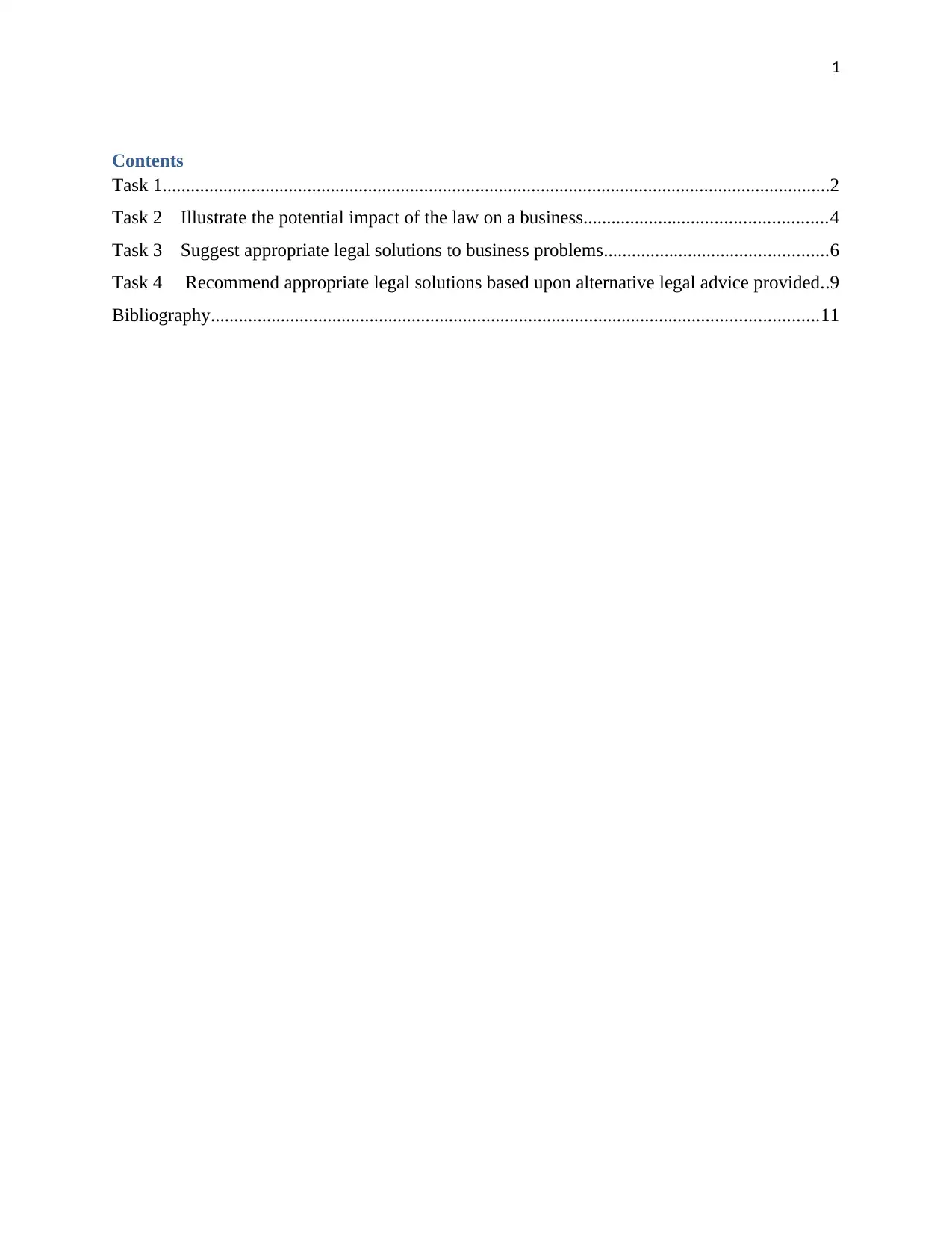
1
Contents
Task 1...............................................................................................................................................2
Task 2 Illustrate the potential impact of the law on a business....................................................4
Task 3 Suggest appropriate legal solutions to business problems................................................6
Task 4 Recommend appropriate legal solutions based upon alternative legal advice provided..9
Bibliography..................................................................................................................................11
Contents
Task 1...............................................................................................................................................2
Task 2 Illustrate the potential impact of the law on a business....................................................4
Task 3 Suggest appropriate legal solutions to business problems................................................6
Task 4 Recommend appropriate legal solutions based upon alternative legal advice provided..9
Bibliography..................................................................................................................................11
Paraphrase This Document
Need a fresh take? Get an instant paraphrase of this document with our AI Paraphraser
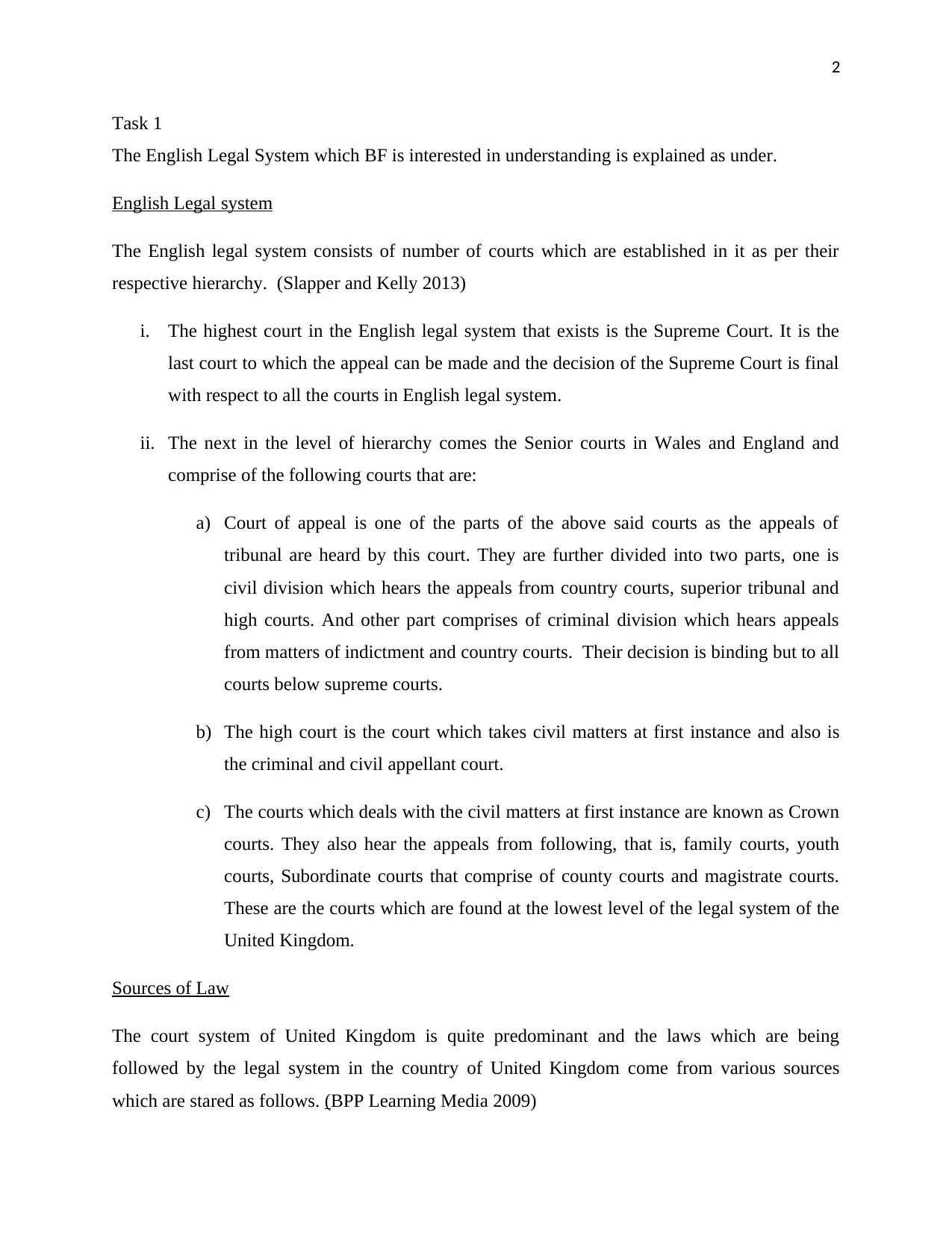
2
Task 1
The English Legal System which BF is interested in understanding is explained as under.
English Legal system
The English legal system consists of number of courts which are established in it as per their
respective hierarchy. (Slapper and Kelly 2013)
i. The highest court in the English legal system that exists is the Supreme Court. It is the
last court to which the appeal can be made and the decision of the Supreme Court is final
with respect to all the courts in English legal system.
ii. The next in the level of hierarchy comes the Senior courts in Wales and England and
comprise of the following courts that are:
a) Court of appeal is one of the parts of the above said courts as the appeals of
tribunal are heard by this court. They are further divided into two parts, one is
civil division which hears the appeals from country courts, superior tribunal and
high courts. And other part comprises of criminal division which hears appeals
from matters of indictment and country courts. Their decision is binding but to all
courts below supreme courts.
b) The high court is the court which takes civil matters at first instance and also is
the criminal and civil appellant court.
c) The courts which deals with the civil matters at first instance are known as Crown
courts. They also hear the appeals from following, that is, family courts, youth
courts, Subordinate courts that comprise of county courts and magistrate courts.
These are the courts which are found at the lowest level of the legal system of the
United Kingdom.
Sources of Law
The court system of United Kingdom is quite predominant and the laws which are being
followed by the legal system in the country of United Kingdom come from various sources
which are stared as follows. (BPP Learning Media 2009)
Task 1
The English Legal System which BF is interested in understanding is explained as under.
English Legal system
The English legal system consists of number of courts which are established in it as per their
respective hierarchy. (Slapper and Kelly 2013)
i. The highest court in the English legal system that exists is the Supreme Court. It is the
last court to which the appeal can be made and the decision of the Supreme Court is final
with respect to all the courts in English legal system.
ii. The next in the level of hierarchy comes the Senior courts in Wales and England and
comprise of the following courts that are:
a) Court of appeal is one of the parts of the above said courts as the appeals of
tribunal are heard by this court. They are further divided into two parts, one is
civil division which hears the appeals from country courts, superior tribunal and
high courts. And other part comprises of criminal division which hears appeals
from matters of indictment and country courts. Their decision is binding but to all
courts below supreme courts.
b) The high court is the court which takes civil matters at first instance and also is
the criminal and civil appellant court.
c) The courts which deals with the civil matters at first instance are known as Crown
courts. They also hear the appeals from following, that is, family courts, youth
courts, Subordinate courts that comprise of county courts and magistrate courts.
These are the courts which are found at the lowest level of the legal system of the
United Kingdom.
Sources of Law
The court system of United Kingdom is quite predominant and the laws which are being
followed by the legal system in the country of United Kingdom come from various sources
which are stared as follows. (BPP Learning Media 2009)
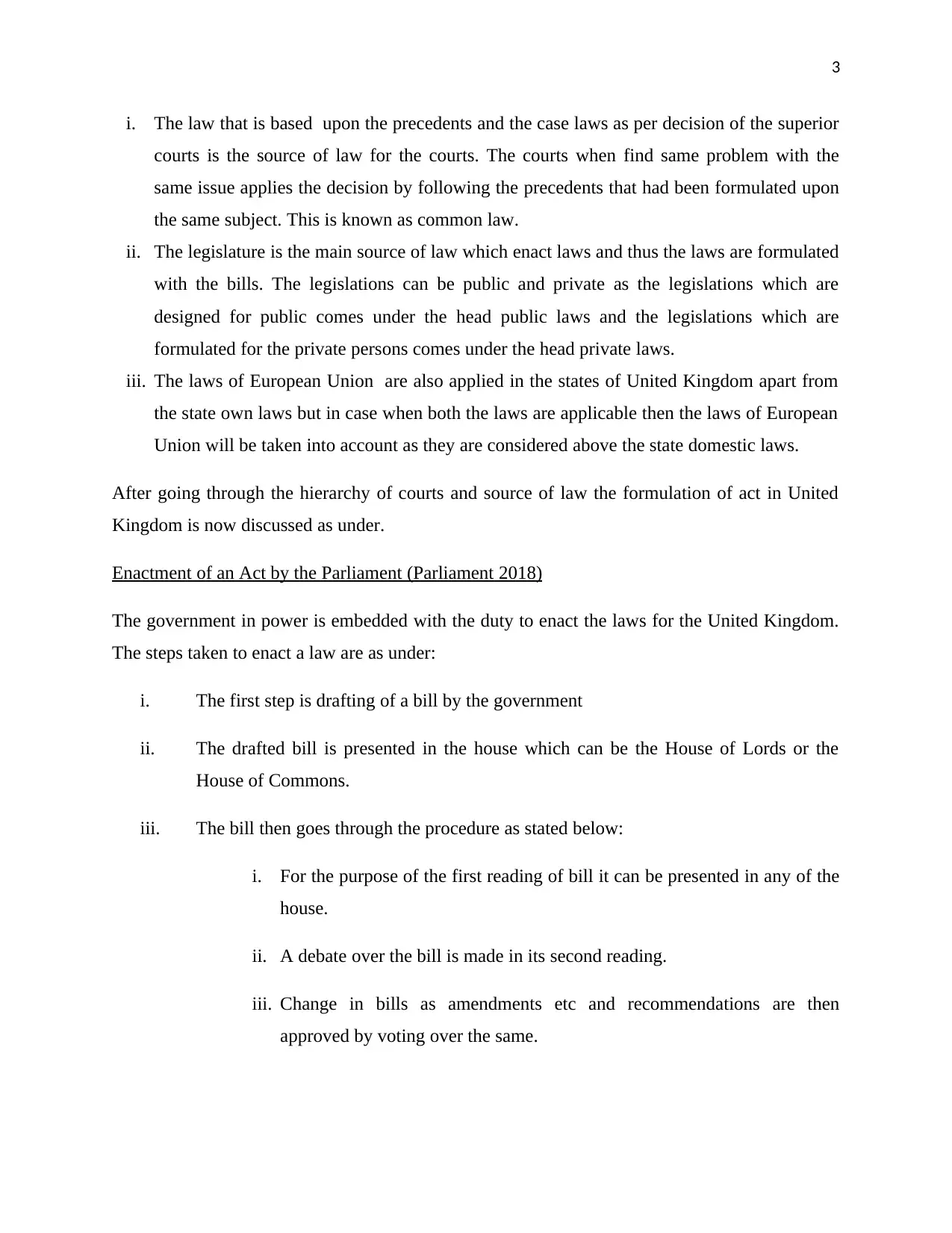
3
i. The law that is based upon the precedents and the case laws as per decision of the superior
courts is the source of law for the courts. The courts when find same problem with the
same issue applies the decision by following the precedents that had been formulated upon
the same subject. This is known as common law.
ii. The legislature is the main source of law which enact laws and thus the laws are formulated
with the bills. The legislations can be public and private as the legislations which are
designed for public comes under the head public laws and the legislations which are
formulated for the private persons comes under the head private laws.
iii. The laws of European Union are also applied in the states of United Kingdom apart from
the state own laws but in case when both the laws are applicable then the laws of European
Union will be taken into account as they are considered above the state domestic laws.
After going through the hierarchy of courts and source of law the formulation of act in United
Kingdom is now discussed as under.
Enactment of an Act by the Parliament (Parliament 2018)
The government in power is embedded with the duty to enact the laws for the United Kingdom.
The steps taken to enact a law are as under:
i. The first step is drafting of a bill by the government
ii. The drafted bill is presented in the house which can be the House of Lords or the
House of Commons.
iii. The bill then goes through the procedure as stated below:
i. For the purpose of the first reading of bill it can be presented in any of the
house.
ii. A debate over the bill is made in its second reading.
iii. Change in bills as amendments etc and recommendations are then
approved by voting over the same.
i. The law that is based upon the precedents and the case laws as per decision of the superior
courts is the source of law for the courts. The courts when find same problem with the
same issue applies the decision by following the precedents that had been formulated upon
the same subject. This is known as common law.
ii. The legislature is the main source of law which enact laws and thus the laws are formulated
with the bills. The legislations can be public and private as the legislations which are
designed for public comes under the head public laws and the legislations which are
formulated for the private persons comes under the head private laws.
iii. The laws of European Union are also applied in the states of United Kingdom apart from
the state own laws but in case when both the laws are applicable then the laws of European
Union will be taken into account as they are considered above the state domestic laws.
After going through the hierarchy of courts and source of law the formulation of act in United
Kingdom is now discussed as under.
Enactment of an Act by the Parliament (Parliament 2018)
The government in power is embedded with the duty to enact the laws for the United Kingdom.
The steps taken to enact a law are as under:
i. The first step is drafting of a bill by the government
ii. The drafted bill is presented in the house which can be the House of Lords or the
House of Commons.
iii. The bill then goes through the procedure as stated below:
i. For the purpose of the first reading of bill it can be presented in any of the
house.
ii. A debate over the bill is made in its second reading.
iii. Change in bills as amendments etc and recommendations are then
approved by voting over the same.
⊘ This is a preview!⊘
Do you want full access?
Subscribe today to unlock all pages.

Trusted by 1+ million students worldwide
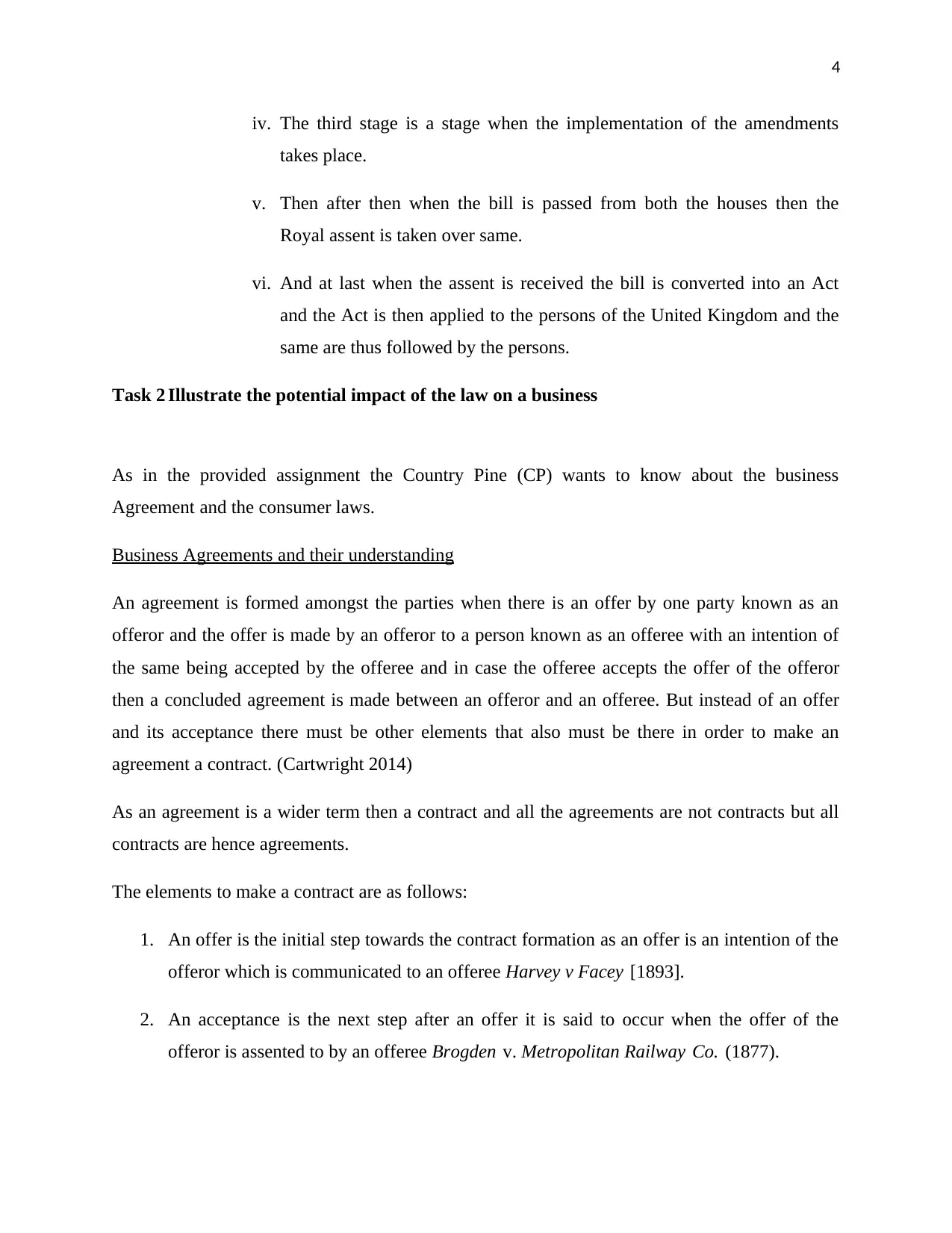
4
iv. The third stage is a stage when the implementation of the amendments
takes place.
v. Then after then when the bill is passed from both the houses then the
Royal assent is taken over same.
vi. And at last when the assent is received the bill is converted into an Act
and the Act is then applied to the persons of the United Kingdom and the
same are thus followed by the persons.
Task 2 Illustrate the potential impact of the law on a business
As in the provided assignment the Country Pine (CP) wants to know about the business
Agreement and the consumer laws.
Business Agreements and their understanding
An agreement is formed amongst the parties when there is an offer by one party known as an
offeror and the offer is made by an offeror to a person known as an offeree with an intention of
the same being accepted by the offeree and in case the offeree accepts the offer of the offeror
then a concluded agreement is made between an offeror and an offeree. But instead of an offer
and its acceptance there must be other elements that also must be there in order to make an
agreement a contract. (Cartwright 2014)
As an agreement is a wider term then a contract and all the agreements are not contracts but all
contracts are hence agreements.
The elements to make a contract are as follows:
1. An offer is the initial step towards the contract formation as an offer is an intention of the
offeror which is communicated to an offeree Harvey v Facey [1893].
2. An acceptance is the next step after an offer it is said to occur when the offer of the
offeror is assented to by an offeree Brogden v. Metropolitan Railway Co. (1877).
iv. The third stage is a stage when the implementation of the amendments
takes place.
v. Then after then when the bill is passed from both the houses then the
Royal assent is taken over same.
vi. And at last when the assent is received the bill is converted into an Act
and the Act is then applied to the persons of the United Kingdom and the
same are thus followed by the persons.
Task 2 Illustrate the potential impact of the law on a business
As in the provided assignment the Country Pine (CP) wants to know about the business
Agreement and the consumer laws.
Business Agreements and their understanding
An agreement is formed amongst the parties when there is an offer by one party known as an
offeror and the offer is made by an offeror to a person known as an offeree with an intention of
the same being accepted by the offeree and in case the offeree accepts the offer of the offeror
then a concluded agreement is made between an offeror and an offeree. But instead of an offer
and its acceptance there must be other elements that also must be there in order to make an
agreement a contract. (Cartwright 2014)
As an agreement is a wider term then a contract and all the agreements are not contracts but all
contracts are hence agreements.
The elements to make a contract are as follows:
1. An offer is the initial step towards the contract formation as an offer is an intention of the
offeror which is communicated to an offeree Harvey v Facey [1893].
2. An acceptance is the next step after an offer it is said to occur when the offer of the
offeror is assented to by an offeree Brogden v. Metropolitan Railway Co. (1877).
Paraphrase This Document
Need a fresh take? Get an instant paraphrase of this document with our AI Paraphraser
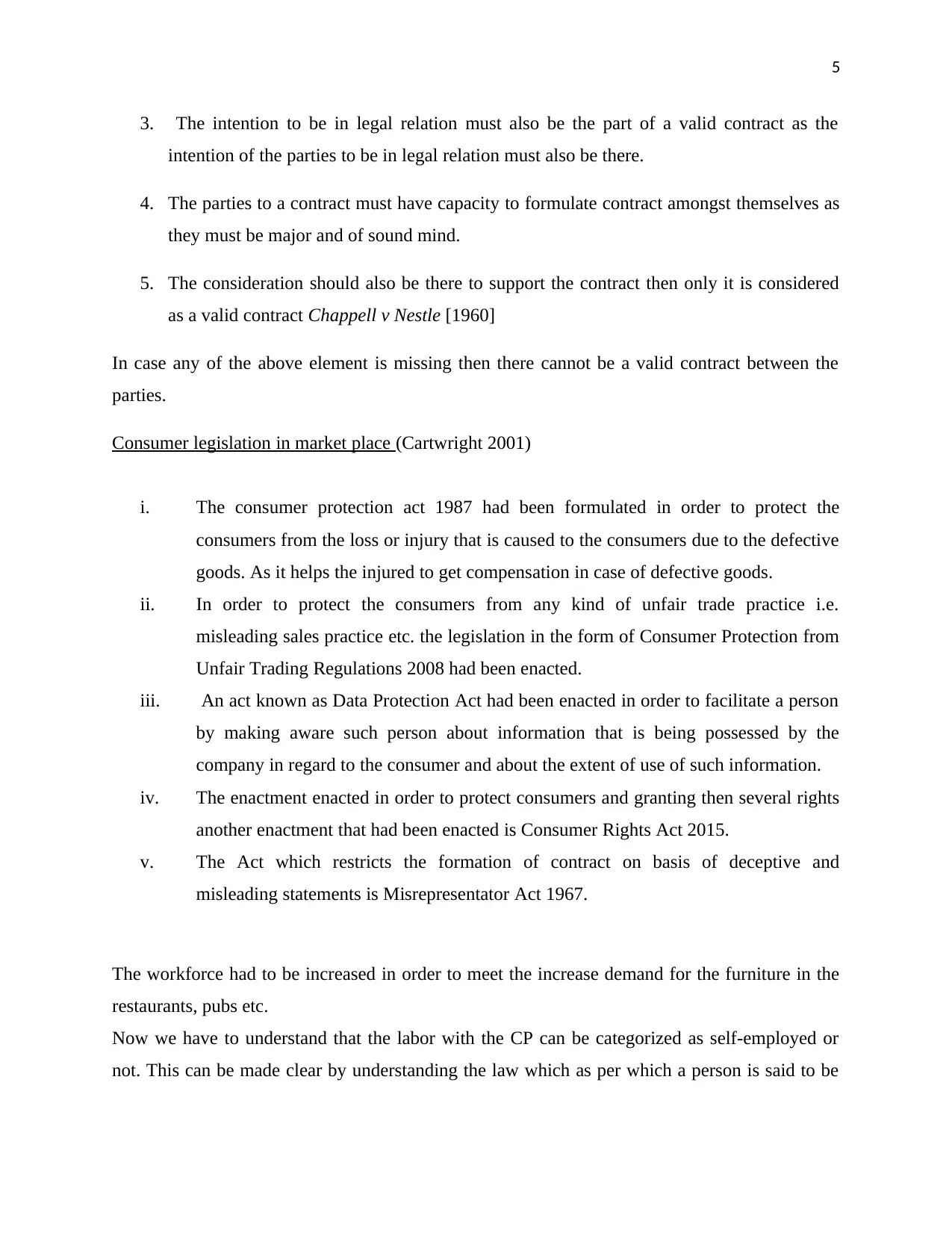
5
3. The intention to be in legal relation must also be the part of a valid contract as the
intention of the parties to be in legal relation must also be there.
4. The parties to a contract must have capacity to formulate contract amongst themselves as
they must be major and of sound mind.
5. The consideration should also be there to support the contract then only it is considered
as a valid contract Chappell v Nestle [1960]
In case any of the above element is missing then there cannot be a valid contract between the
parties.
Consumer legislation in market place (Cartwright 2001)
i. The consumer protection act 1987 had been formulated in order to protect the
consumers from the loss or injury that is caused to the consumers due to the defective
goods. As it helps the injured to get compensation in case of defective goods.
ii. In order to protect the consumers from any kind of unfair trade practice i.e.
misleading sales practice etc. the legislation in the form of Consumer Protection from
Unfair Trading Regulations 2008 had been enacted.
iii. An act known as Data Protection Act had been enacted in order to facilitate a person
by making aware such person about information that is being possessed by the
company in regard to the consumer and about the extent of use of such information.
iv. The enactment enacted in order to protect consumers and granting then several rights
another enactment that had been enacted is Consumer Rights Act 2015.
v. The Act which restricts the formation of contract on basis of deceptive and
misleading statements is Misrepresentator Act 1967.
The workforce had to be increased in order to meet the increase demand for the furniture in the
restaurants, pubs etc.
Now we have to understand that the labor with the CP can be categorized as self-employed or
not. This can be made clear by understanding the law which as per which a person is said to be
3. The intention to be in legal relation must also be the part of a valid contract as the
intention of the parties to be in legal relation must also be there.
4. The parties to a contract must have capacity to formulate contract amongst themselves as
they must be major and of sound mind.
5. The consideration should also be there to support the contract then only it is considered
as a valid contract Chappell v Nestle [1960]
In case any of the above element is missing then there cannot be a valid contract between the
parties.
Consumer legislation in market place (Cartwright 2001)
i. The consumer protection act 1987 had been formulated in order to protect the
consumers from the loss or injury that is caused to the consumers due to the defective
goods. As it helps the injured to get compensation in case of defective goods.
ii. In order to protect the consumers from any kind of unfair trade practice i.e.
misleading sales practice etc. the legislation in the form of Consumer Protection from
Unfair Trading Regulations 2008 had been enacted.
iii. An act known as Data Protection Act had been enacted in order to facilitate a person
by making aware such person about information that is being possessed by the
company in regard to the consumer and about the extent of use of such information.
iv. The enactment enacted in order to protect consumers and granting then several rights
another enactment that had been enacted is Consumer Rights Act 2015.
v. The Act which restricts the formation of contract on basis of deceptive and
misleading statements is Misrepresentator Act 1967.
The workforce had to be increased in order to meet the increase demand for the furniture in the
restaurants, pubs etc.
Now we have to understand that the labor with the CP can be categorized as self-employed or
not. This can be made clear by understanding the law which as per which a person is said to be
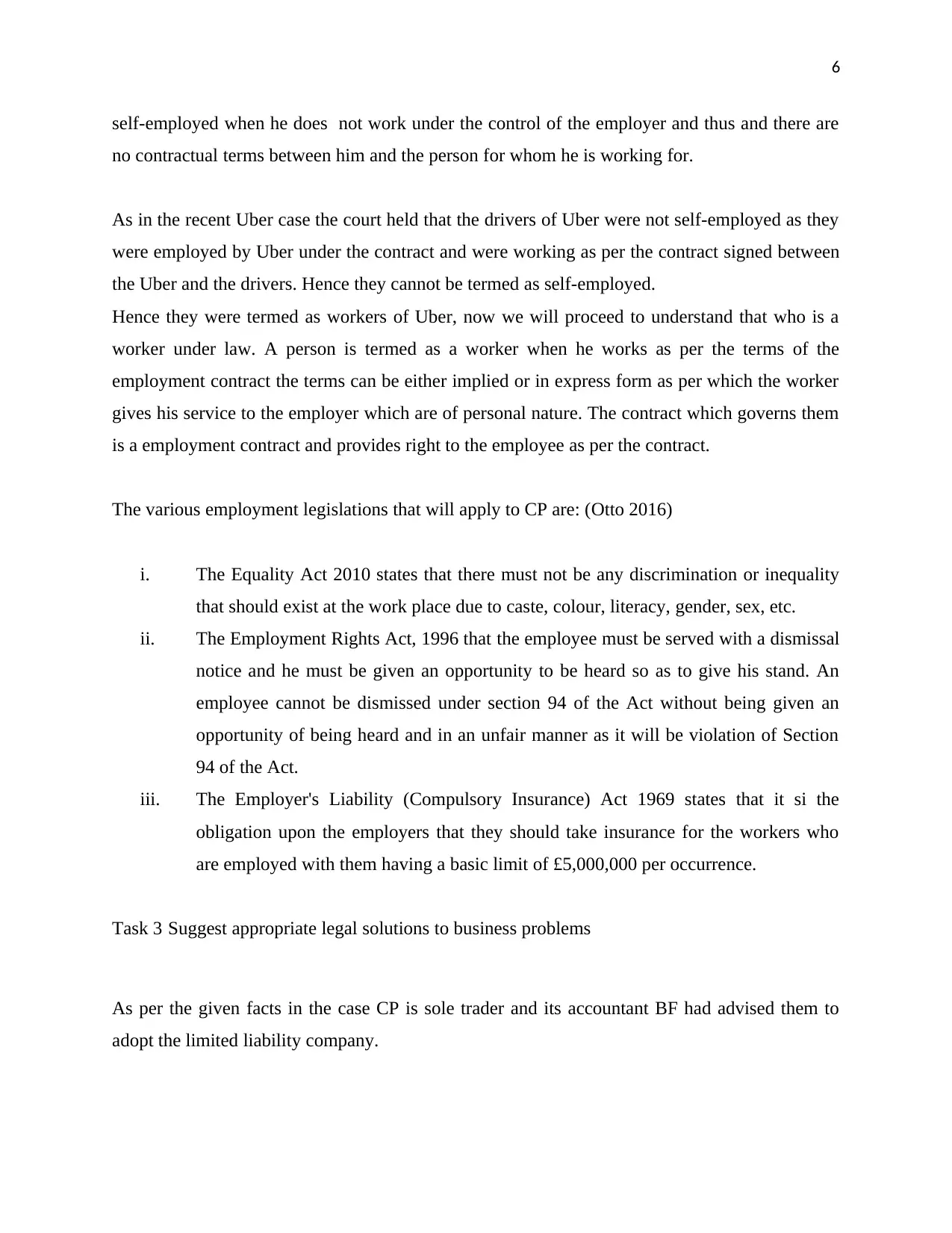
6
self-employed when he does not work under the control of the employer and thus and there are
no contractual terms between him and the person for whom he is working for.
As in the recent Uber case the court held that the drivers of Uber were not self-employed as they
were employed by Uber under the contract and were working as per the contract signed between
the Uber and the drivers. Hence they cannot be termed as self-employed.
Hence they were termed as workers of Uber, now we will proceed to understand that who is a
worker under law. A person is termed as a worker when he works as per the terms of the
employment contract the terms can be either implied or in express form as per which the worker
gives his service to the employer which are of personal nature. The contract which governs them
is a employment contract and provides right to the employee as per the contract.
The various employment legislations that will apply to CP are: (Otto 2016)
i. The Equality Act 2010 states that there must not be any discrimination or inequality
that should exist at the work place due to caste, colour, literacy, gender, sex, etc.
ii. The Employment Rights Act, 1996 that the employee must be served with a dismissal
notice and he must be given an opportunity to be heard so as to give his stand. An
employee cannot be dismissed under section 94 of the Act without being given an
opportunity of being heard and in an unfair manner as it will be violation of Section
94 of the Act.
iii. The Employer's Liability (Compulsory Insurance) Act 1969 states that it si the
obligation upon the employers that they should take insurance for the workers who
are employed with them having a basic limit of £5,000,000 per occurrence.
Task 3 Suggest appropriate legal solutions to business problems
As per the given facts in the case CP is sole trader and its accountant BF had advised them to
adopt the limited liability company.
self-employed when he does not work under the control of the employer and thus and there are
no contractual terms between him and the person for whom he is working for.
As in the recent Uber case the court held that the drivers of Uber were not self-employed as they
were employed by Uber under the contract and were working as per the contract signed between
the Uber and the drivers. Hence they cannot be termed as self-employed.
Hence they were termed as workers of Uber, now we will proceed to understand that who is a
worker under law. A person is termed as a worker when he works as per the terms of the
employment contract the terms can be either implied or in express form as per which the worker
gives his service to the employer which are of personal nature. The contract which governs them
is a employment contract and provides right to the employee as per the contract.
The various employment legislations that will apply to CP are: (Otto 2016)
i. The Equality Act 2010 states that there must not be any discrimination or inequality
that should exist at the work place due to caste, colour, literacy, gender, sex, etc.
ii. The Employment Rights Act, 1996 that the employee must be served with a dismissal
notice and he must be given an opportunity to be heard so as to give his stand. An
employee cannot be dismissed under section 94 of the Act without being given an
opportunity of being heard and in an unfair manner as it will be violation of Section
94 of the Act.
iii. The Employer's Liability (Compulsory Insurance) Act 1969 states that it si the
obligation upon the employers that they should take insurance for the workers who
are employed with them having a basic limit of £5,000,000 per occurrence.
Task 3 Suggest appropriate legal solutions to business problems
As per the given facts in the case CP is sole trader and its accountant BF had advised them to
adopt the limited liability company.
⊘ This is a preview!⊘
Do you want full access?
Subscribe today to unlock all pages.

Trusted by 1+ million students worldwide
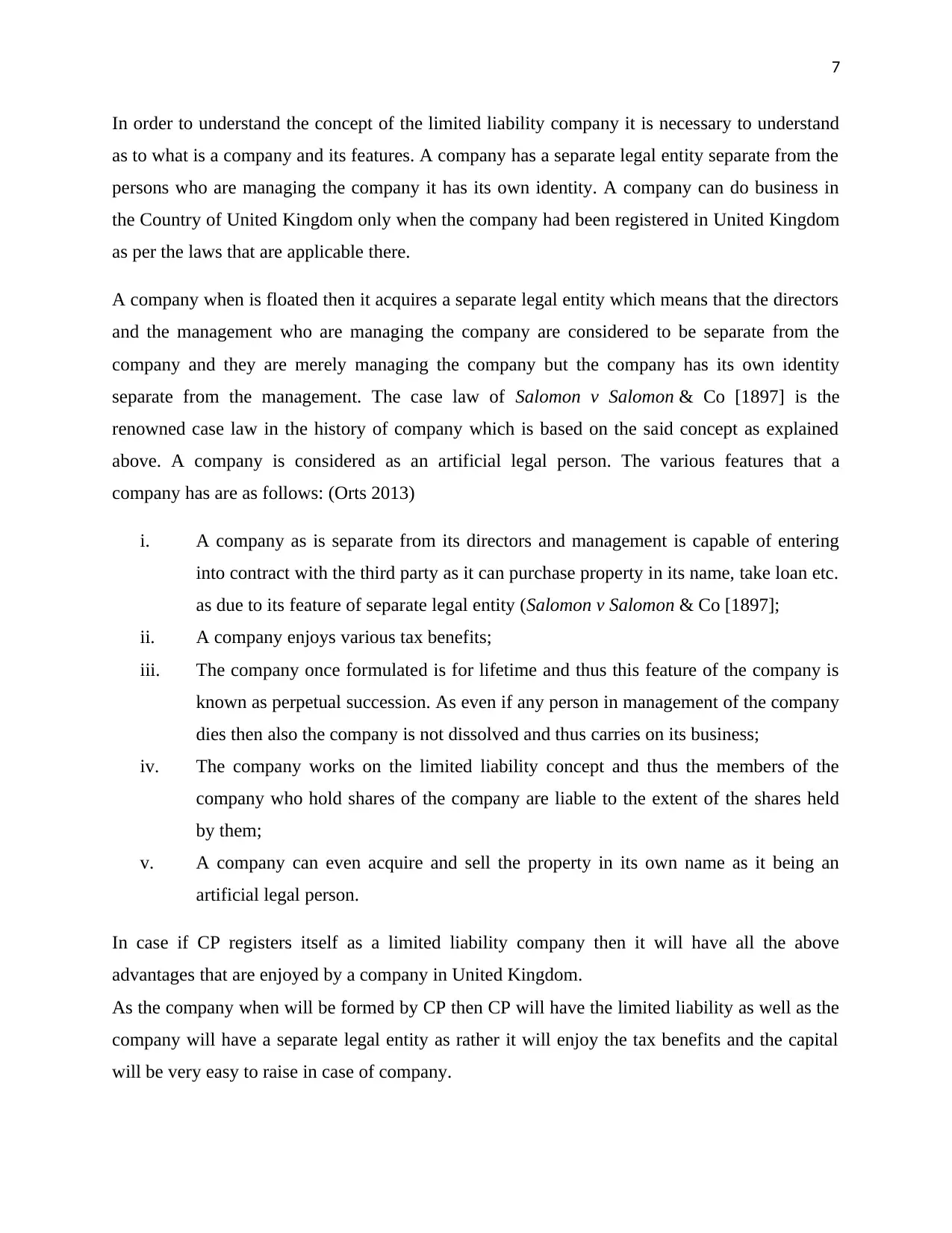
7
In order to understand the concept of the limited liability company it is necessary to understand
as to what is a company and its features. A company has a separate legal entity separate from the
persons who are managing the company it has its own identity. A company can do business in
the Country of United Kingdom only when the company had been registered in United Kingdom
as per the laws that are applicable there.
A company when is floated then it acquires a separate legal entity which means that the directors
and the management who are managing the company are considered to be separate from the
company and they are merely managing the company but the company has its own identity
separate from the management. The case law of Salomon v Salomon & Co [1897] is the
renowned case law in the history of company which is based on the said concept as explained
above. A company is considered as an artificial legal person. The various features that a
company has are as follows: (Orts 2013)
i. A company as is separate from its directors and management is capable of entering
into contract with the third party as it can purchase property in its name, take loan etc.
as due to its feature of separate legal entity (Salomon v Salomon & Co [1897];
ii. A company enjoys various tax benefits;
iii. The company once formulated is for lifetime and thus this feature of the company is
known as perpetual succession. As even if any person in management of the company
dies then also the company is not dissolved and thus carries on its business;
iv. The company works on the limited liability concept and thus the members of the
company who hold shares of the company are liable to the extent of the shares held
by them;
v. A company can even acquire and sell the property in its own name as it being an
artificial legal person.
In case if CP registers itself as a limited liability company then it will have all the above
advantages that are enjoyed by a company in United Kingdom.
As the company when will be formed by CP then CP will have the limited liability as well as the
company will have a separate legal entity as rather it will enjoy the tax benefits and the capital
will be very easy to raise in case of company.
In order to understand the concept of the limited liability company it is necessary to understand
as to what is a company and its features. A company has a separate legal entity separate from the
persons who are managing the company it has its own identity. A company can do business in
the Country of United Kingdom only when the company had been registered in United Kingdom
as per the laws that are applicable there.
A company when is floated then it acquires a separate legal entity which means that the directors
and the management who are managing the company are considered to be separate from the
company and they are merely managing the company but the company has its own identity
separate from the management. The case law of Salomon v Salomon & Co [1897] is the
renowned case law in the history of company which is based on the said concept as explained
above. A company is considered as an artificial legal person. The various features that a
company has are as follows: (Orts 2013)
i. A company as is separate from its directors and management is capable of entering
into contract with the third party as it can purchase property in its name, take loan etc.
as due to its feature of separate legal entity (Salomon v Salomon & Co [1897];
ii. A company enjoys various tax benefits;
iii. The company once formulated is for lifetime and thus this feature of the company is
known as perpetual succession. As even if any person in management of the company
dies then also the company is not dissolved and thus carries on its business;
iv. The company works on the limited liability concept and thus the members of the
company who hold shares of the company are liable to the extent of the shares held
by them;
v. A company can even acquire and sell the property in its own name as it being an
artificial legal person.
In case if CP registers itself as a limited liability company then it will have all the above
advantages that are enjoyed by a company in United Kingdom.
As the company when will be formed by CP then CP will have the limited liability as well as the
company will have a separate legal entity as rather it will enjoy the tax benefits and the capital
will be very easy to raise in case of company.
Paraphrase This Document
Need a fresh take? Get an instant paraphrase of this document with our AI Paraphraser
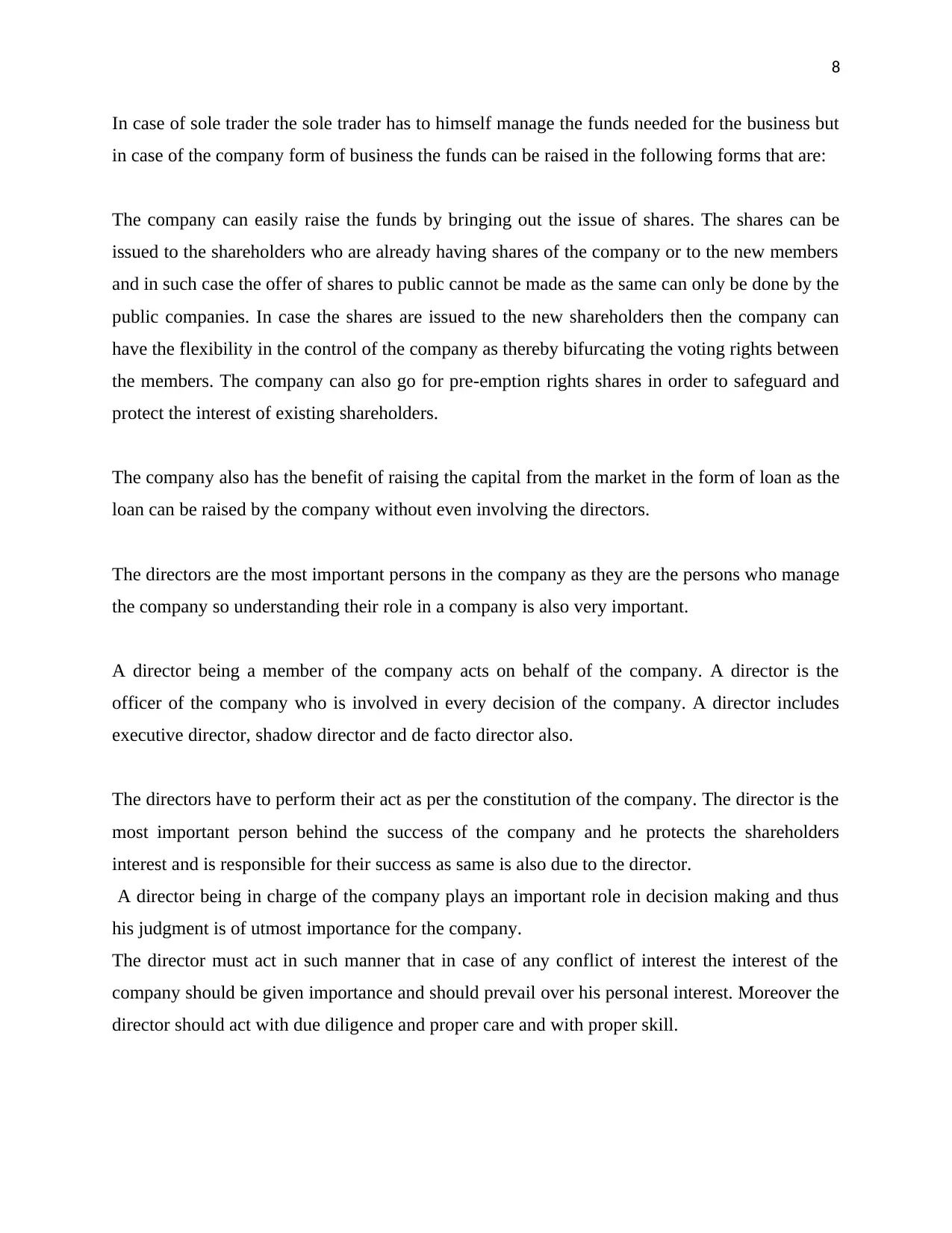
8
In case of sole trader the sole trader has to himself manage the funds needed for the business but
in case of the company form of business the funds can be raised in the following forms that are:
The company can easily raise the funds by bringing out the issue of shares. The shares can be
issued to the shareholders who are already having shares of the company or to the new members
and in such case the offer of shares to public cannot be made as the same can only be done by the
public companies. In case the shares are issued to the new shareholders then the company can
have the flexibility in the control of the company as thereby bifurcating the voting rights between
the members. The company can also go for pre-emption rights shares in order to safeguard and
protect the interest of existing shareholders.
The company also has the benefit of raising the capital from the market in the form of loan as the
loan can be raised by the company without even involving the directors.
The directors are the most important persons in the company as they are the persons who manage
the company so understanding their role in a company is also very important.
A director being a member of the company acts on behalf of the company. A director is the
officer of the company who is involved in every decision of the company. A director includes
executive director, shadow director and de facto director also.
The directors have to perform their act as per the constitution of the company. The director is the
most important person behind the success of the company and he protects the shareholders
interest and is responsible for their success as same is also due to the director.
A director being in charge of the company plays an important role in decision making and thus
his judgment is of utmost importance for the company.
The director must act in such manner that in case of any conflict of interest the interest of the
company should be given importance and should prevail over his personal interest. Moreover the
director should act with due diligence and proper care and with proper skill.
In case of sole trader the sole trader has to himself manage the funds needed for the business but
in case of the company form of business the funds can be raised in the following forms that are:
The company can easily raise the funds by bringing out the issue of shares. The shares can be
issued to the shareholders who are already having shares of the company or to the new members
and in such case the offer of shares to public cannot be made as the same can only be done by the
public companies. In case the shares are issued to the new shareholders then the company can
have the flexibility in the control of the company as thereby bifurcating the voting rights between
the members. The company can also go for pre-emption rights shares in order to safeguard and
protect the interest of existing shareholders.
The company also has the benefit of raising the capital from the market in the form of loan as the
loan can be raised by the company without even involving the directors.
The directors are the most important persons in the company as they are the persons who manage
the company so understanding their role in a company is also very important.
A director being a member of the company acts on behalf of the company. A director is the
officer of the company who is involved in every decision of the company. A director includes
executive director, shadow director and de facto director also.
The directors have to perform their act as per the constitution of the company. The director is the
most important person behind the success of the company and he protects the shareholders
interest and is responsible for their success as same is also due to the director.
A director being in charge of the company plays an important role in decision making and thus
his judgment is of utmost importance for the company.
The director must act in such manner that in case of any conflict of interest the interest of the
company should be given importance and should prevail over his personal interest. Moreover the
director should act with due diligence and proper care and with proper skill.
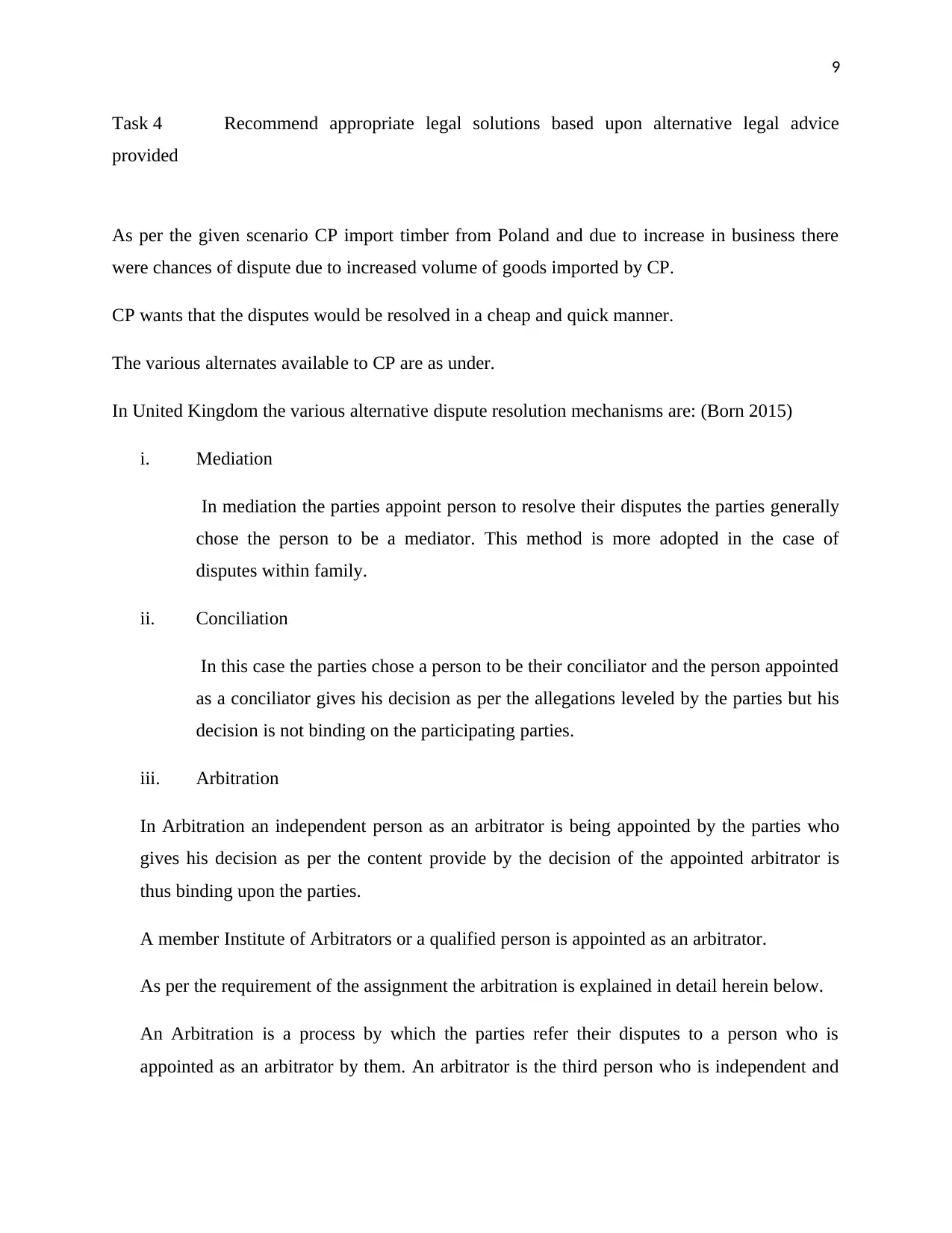
9
Task 4 Recommend appropriate legal solutions based upon alternative legal advice
provided
As per the given scenario CP import timber from Poland and due to increase in business there
were chances of dispute due to increased volume of goods imported by CP.
CP wants that the disputes would be resolved in a cheap and quick manner.
The various alternates available to CP are as under.
In United Kingdom the various alternative dispute resolution mechanisms are: (Born 2015)
i. Mediation
In mediation the parties appoint person to resolve their disputes the parties generally
chose the person to be a mediator. This method is more adopted in the case of
disputes within family.
ii. Conciliation
In this case the parties chose a person to be their conciliator and the person appointed
as a conciliator gives his decision as per the allegations leveled by the parties but his
decision is not binding on the participating parties.
iii. Arbitration
In Arbitration an independent person as an arbitrator is being appointed by the parties who
gives his decision as per the content provide by the decision of the appointed arbitrator is
thus binding upon the parties.
A member Institute of Arbitrators or a qualified person is appointed as an arbitrator.
As per the requirement of the assignment the arbitration is explained in detail herein below.
An Arbitration is a process by which the parties refer their disputes to a person who is
appointed as an arbitrator by them. An arbitrator is the third person who is independent and
Task 4 Recommend appropriate legal solutions based upon alternative legal advice
provided
As per the given scenario CP import timber from Poland and due to increase in business there
were chances of dispute due to increased volume of goods imported by CP.
CP wants that the disputes would be resolved in a cheap and quick manner.
The various alternates available to CP are as under.
In United Kingdom the various alternative dispute resolution mechanisms are: (Born 2015)
i. Mediation
In mediation the parties appoint person to resolve their disputes the parties generally
chose the person to be a mediator. This method is more adopted in the case of
disputes within family.
ii. Conciliation
In this case the parties chose a person to be their conciliator and the person appointed
as a conciliator gives his decision as per the allegations leveled by the parties but his
decision is not binding on the participating parties.
iii. Arbitration
In Arbitration an independent person as an arbitrator is being appointed by the parties who
gives his decision as per the content provide by the decision of the appointed arbitrator is
thus binding upon the parties.
A member Institute of Arbitrators or a qualified person is appointed as an arbitrator.
As per the requirement of the assignment the arbitration is explained in detail herein below.
An Arbitration is a process by which the parties refer their disputes to a person who is
appointed as an arbitrator by them. An arbitrator is the third person who is independent and
⊘ This is a preview!⊘
Do you want full access?
Subscribe today to unlock all pages.

Trusted by 1+ million students worldwide
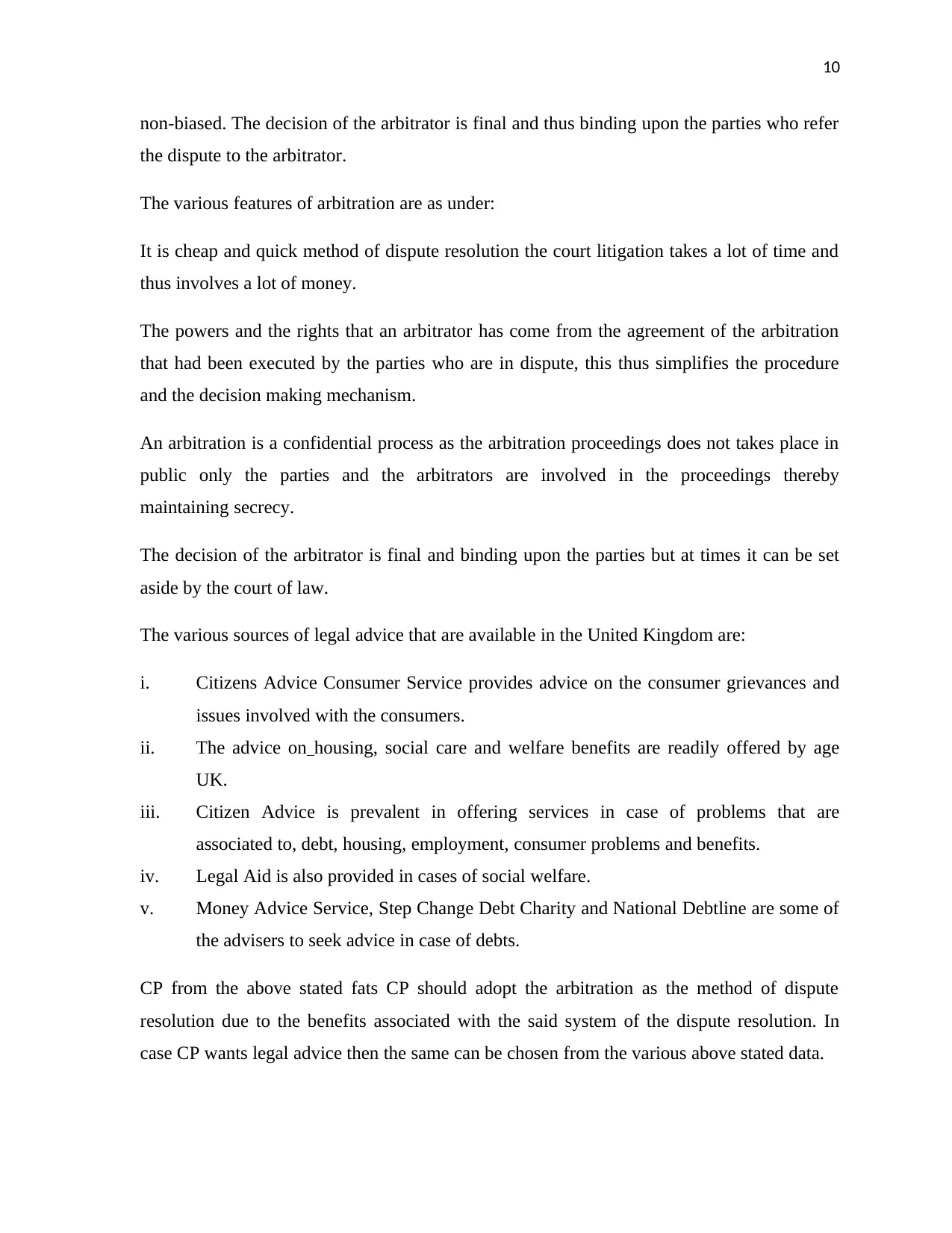
10
non-biased. The decision of the arbitrator is final and thus binding upon the parties who refer
the dispute to the arbitrator.
The various features of arbitration are as under:
It is cheap and quick method of dispute resolution the court litigation takes a lot of time and
thus involves a lot of money.
The powers and the rights that an arbitrator has come from the agreement of the arbitration
that had been executed by the parties who are in dispute, this thus simplifies the procedure
and the decision making mechanism.
An arbitration is a confidential process as the arbitration proceedings does not takes place in
public only the parties and the arbitrators are involved in the proceedings thereby
maintaining secrecy.
The decision of the arbitrator is final and binding upon the parties but at times it can be set
aside by the court of law.
The various sources of legal advice that are available in the United Kingdom are:
i. Citizens Advice Consumer Service provides advice on the consumer grievances and
issues involved with the consumers.
ii. The advice on housing, social care and welfare benefits are readily offered by age
UK.
iii. Citizen Advice is prevalent in offering services in case of problems that are
associated to, debt, housing, employment, consumer problems and benefits.
iv. Legal Aid is also provided in cases of social welfare.
v. Money Advice Service, Step Change Debt Charity and National Debtline are some of
the advisers to seek advice in case of debts.
CP from the above stated fats CP should adopt the arbitration as the method of dispute
resolution due to the benefits associated with the said system of the dispute resolution. In
case CP wants legal advice then the same can be chosen from the various above stated data.
non-biased. The decision of the arbitrator is final and thus binding upon the parties who refer
the dispute to the arbitrator.
The various features of arbitration are as under:
It is cheap and quick method of dispute resolution the court litigation takes a lot of time and
thus involves a lot of money.
The powers and the rights that an arbitrator has come from the agreement of the arbitration
that had been executed by the parties who are in dispute, this thus simplifies the procedure
and the decision making mechanism.
An arbitration is a confidential process as the arbitration proceedings does not takes place in
public only the parties and the arbitrators are involved in the proceedings thereby
maintaining secrecy.
The decision of the arbitrator is final and binding upon the parties but at times it can be set
aside by the court of law.
The various sources of legal advice that are available in the United Kingdom are:
i. Citizens Advice Consumer Service provides advice on the consumer grievances and
issues involved with the consumers.
ii. The advice on housing, social care and welfare benefits are readily offered by age
UK.
iii. Citizen Advice is prevalent in offering services in case of problems that are
associated to, debt, housing, employment, consumer problems and benefits.
iv. Legal Aid is also provided in cases of social welfare.
v. Money Advice Service, Step Change Debt Charity and National Debtline are some of
the advisers to seek advice in case of debts.
CP from the above stated fats CP should adopt the arbitration as the method of dispute
resolution due to the benefits associated with the said system of the dispute resolution. In
case CP wants legal advice then the same can be chosen from the various above stated data.
Paraphrase This Document
Need a fresh take? Get an instant paraphrase of this document with our AI Paraphraser
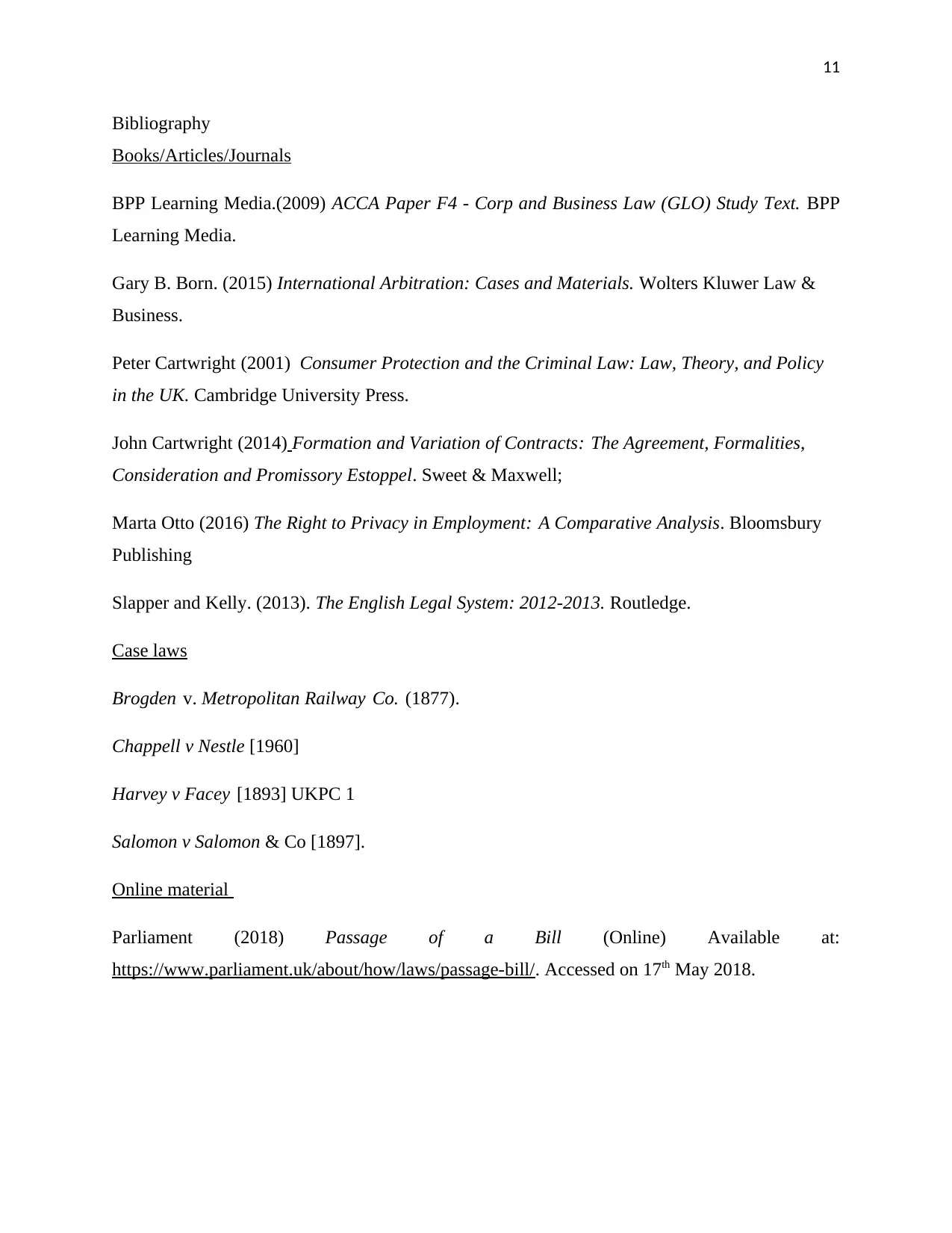
11
Bibliography
Books/Articles/Journals
BPP Learning Media.(2009) ACCA Paper F4 - Corp and Business Law (GLO) Study Text. BPP
Learning Media.
Gary B. Born. (2015) International Arbitration: Cases and Materials. Wolters Kluwer Law &
Business.
Peter Cartwright (2001) Consumer Protection and the Criminal Law: Law, Theory, and Policy
in the UK. Cambridge University Press.
John Cartwright (2014) Formation and Variation of Contracts: The Agreement, Formalities,
Consideration and Promissory Estoppel. Sweet & Maxwell;
Marta Otto (2016) The Right to Privacy in Employment: A Comparative Analysis. Bloomsbury
Publishing
Slapper and Kelly. (2013). The English Legal System: 2012-2013. Routledge.
Case laws
Brogden v. Metropolitan Railway Co. (1877).
Chappell v Nestle [1960]
Harvey v Facey [1893] UKPC 1
Salomon v Salomon & Co [1897].
Online material
Parliament (2018) Passage of a Bill (Online) Available at:
https://www.parliament.uk/about/how/laws/passage-bill/. Accessed on 17th May 2018.
Bibliography
Books/Articles/Journals
BPP Learning Media.(2009) ACCA Paper F4 - Corp and Business Law (GLO) Study Text. BPP
Learning Media.
Gary B. Born. (2015) International Arbitration: Cases and Materials. Wolters Kluwer Law &
Business.
Peter Cartwright (2001) Consumer Protection and the Criminal Law: Law, Theory, and Policy
in the UK. Cambridge University Press.
John Cartwright (2014) Formation and Variation of Contracts: The Agreement, Formalities,
Consideration and Promissory Estoppel. Sweet & Maxwell;
Marta Otto (2016) The Right to Privacy in Employment: A Comparative Analysis. Bloomsbury
Publishing
Slapper and Kelly. (2013). The English Legal System: 2012-2013. Routledge.
Case laws
Brogden v. Metropolitan Railway Co. (1877).
Chappell v Nestle [1960]
Harvey v Facey [1893] UKPC 1
Salomon v Salomon & Co [1897].
Online material
Parliament (2018) Passage of a Bill (Online) Available at:
https://www.parliament.uk/about/how/laws/passage-bill/. Accessed on 17th May 2018.
1 out of 11
Related Documents
Your All-in-One AI-Powered Toolkit for Academic Success.
+13062052269
info@desklib.com
Available 24*7 on WhatsApp / Email
![[object Object]](/_next/static/media/star-bottom.7253800d.svg)
Unlock your academic potential
Copyright © 2020–2026 A2Z Services. All Rights Reserved. Developed and managed by ZUCOL.



